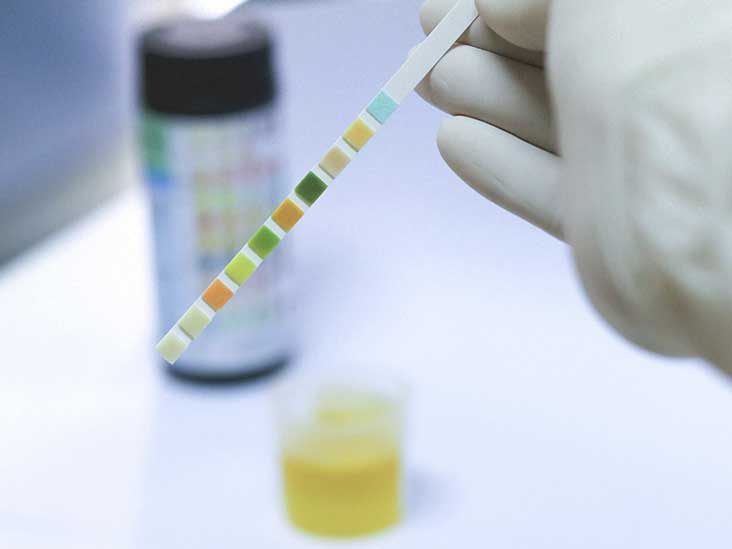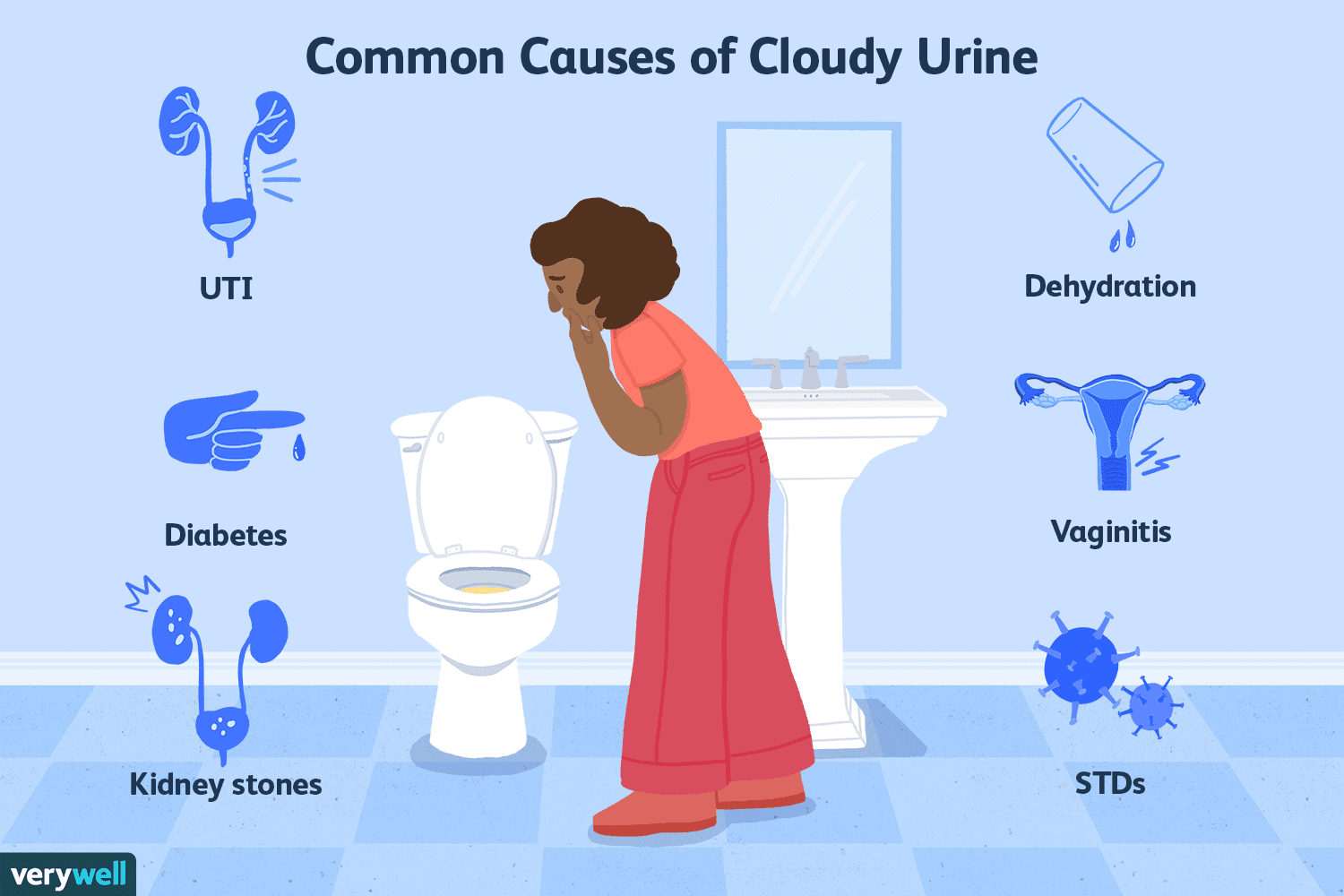Is cloudy urine dangerous?
 |
The elimination of urine is very important for different bodily functions; it regulates the balance of water in the body and gets rid of substances that are produced during metabolic processes and are no longer needed by the body.
The color, odor and amount of urine can indicate whether something is wrong. The ideal healthy urine color is a straw yellow color, and anything darker or lighter — like cloudy urine — may indicate that you have a health issue on your hands, such as a urinary tract infection (UTI).
What does it mean if your urine is cloudy? Cloudy urine can be among common UTI symptoms, and UTIs are among the most common bacterial infections affecting women. Cloudy urine in men and children certainly occurs as well, and there are also many other possible reasons for cloudy urine in addition to UTIs.
To make a self-diagnosis using the color of your urine, you have to be aware of the possible causes of cloudy urine and the best ways to treat or prevent health problems that are associated with cloudy pee.
What Is Cloudy Urine?
Urine is a liquid waste product that’s filtered from the blood by the kidneys, stored in the bladder and expelled from the body during urination. Because urine is a compilation of the waste that has been present in your body, it’s a good indicator of your current health condition.
Normal, healthy urine is clear and has a light yellow, straw-like color to it. When urine becomes murky, foamy or opaque, it is often referred to as cloudy urine. White cloudy urine, cloudy yellow urine, dark cloudy urine are all different variations of abnormal urine that is cloudy.
The answer to the question, “Why is my urine cloudy?” can have several answers so let’s take a look at the possibilities now.
 |
Potential Causes of Cloudy Urine
What does cloudy urine mean? What causes cloudy urine? There are a few possible causes of cloudy urine, some more serious than others.
1. Dehydration
Do you have cloudy urine no pain present? It may be a sign of dehydration, and when it occurs without symptoms and goes away rapidly, there are usually few consequences. In order to avoid a health scare, be sure to drink plenty of fluids throughout the day.
2. Infections, often UTIs
Certain health conditions can cause excess protein or crystalline substances in the urine, which causes it to appear cloudy or foamy. Infections in the urinary tract can cause blood and pus to appear in the urine, giving it a cloudy appearance. A specific type of urinary tract infection called cystitis (which is a bladder infection) may cause cloudy or murky urine, along with painful urination.
Cloudy or murky urine during pregnancy may be due to a urinary tract infection, as UTIs are the most frequent medical complication of pregnancy. It’s important that pregnant women seek medical attention if they notice cloudy urine during pregnancy or other UTI symptoms because risk factors, such as preterm delivery and low infant weight, are most commonly associated with bacterial infections during pregnancy.
3. Kidney problems
What if you experience cloudy urine but don’t have a UTI? Kidney stones, which affect up to five percent of the population, or a kidney infection may also cause cloudy urine because they can cause pus in the urine, which gives it a milky or cloudy appearance.
Kidney stone symptoms can be extremely painful and similar to the symptoms of a bladder infection. Because a kidney stone sometimes has jagged edges, it can tear against the ureter as the body tries to pass it. The tearing can cause an infection, which causes pus to be produced, thereby causing the urine to appear cloudy.
4. Certain diseases
Some diseases, such as diabetes, preeclampsia and heart disease, affect other body systems in addition to the urinary tract and may cause your pee to appear cloudy.
5. STDs
What STD causes cloudy urine? STDs that can cause urine to become cloudy include gonorrhea and chlamydia. Cloudy urine may be a symptom of gonorrhea, a sexually transmitted disease (STD) that can infect both men and women. Gonorrhea causes infections in the genitals and rectum, which causes increased discharge from the penis and vagina. The discharge mixed with urine may make urine appear cloudy. Chlamydia, another very serious STD that may go undetected, can also cause cloudy urine.
6. Cancer
Is cloudy urine a sign of cancer? According to Mount Sinai Medical Center, “Late stages of prostate cancer or prostate enlargement can manifest cloudy urine brought on by blood or sediment that has accumulated in an obstructed bladder.”
Diagnosing Cause of Cloudy Urine
Paying attention to signs and symptoms that exist in conjunction with cloudy urine can help you make a diagnosis. For instance, if you experience pain along with the murky urine, you may have a urinary tract infection or kidney stones. Both UTIs and kidney stones can cause cloudy urine and back pain.
Pain from a urinary tract infection is typically present while you urinate, and you may have foul smelling urine as well. Passing a kidney stone can be painful whether you’re urinating or not. Kidney stone pain can be agonizing until you pass the stone or stones.
Cloudy urine doesn’t always mean that you have a serious health condition or infection. If you notice your urine is cloudy for several days in a row, you may want to see your health care provider. When you first notice that your urine is cloudy, think about the medications that you take, what you’ve eaten that day, if you’ve had sex recently (as discharge mixed with pee can make it appear cloudy) and how you feel.
A urinalysis is a test of a urine sample that will reveal any problems of the urinary tract and other body systems. It assesses the color, clarity and concentration of urine, as well as the chemical composition. A urinalysis will also detect the existence of bacteria in the urinary tract.
 |
Symptoms of a Bladder Infection
Cystitis, which is a bladder infection, is the inflammation of the bladder that’s often referred to as a urinary tract infection. It’s usually caused by bacteria that get into the urethra and enter the bladder. Once the bacteria are in the bladder, they stick to the bladder wall and multiply, which leads to inflammation of the tissue that lines the inside of the bladder. A common sign of cystitis is cloudy urine as well as discomfort or pain in the bladder and the surrounding pelvic region.
The symptoms of uncomplicated cystitis include frequently having to go to the bathroom and a stinging or burning feeling when urinating. Many women with bladder infections find that it’s particularly painful when their bladders are almost or completely empty. Some other common symptoms of a bladder infection include:
having a sudden need to urinate
feeling like you have to urinate but only a small amount of urine comes out
difficulty holding back urine
urine that’s cloudy in color
urine that has blood in it
urine that has an unusual smell
Cloudy Urine Precautions
Although cloudy or murky urine does not always mean you have a serious health problem, if you notice that the cloudy or murky color lasts for several days, even after you’ve tried some home remedies to reverse the issue, it’s a good idea to reach out to your health care provider.
Some medical conditions that cause clouding of the urine, like sexually transmitted diseases or kidney problems, shouldn’t be ignored, and they typically won’t go away on their own. Only a proper urinalysis that’s taken at a medical lab or doctor’s office can accurately diagnose potential medical conditions./.
( Christine Ruggeri )
Recommended
 Handbook
Handbook
Vietnam Moves Up 8 Places In World Happiness Index
 Handbook
Handbook
Travelling Vietnam Through French Artist's Children Book
 Multimedia
Multimedia
Vietnamese Turmeric Fish among Best Asian Dishes: TasteAtlas
 Handbook
Handbook
From Lost to Found: German Tourist Thanks Vietnamese Police for Returning His Bag
Popular article
 Handbook
Handbook
Prediction and Resolution for the Disasters of Humanity
 Handbook
Handbook
16 French Films To Be Shown For Free During Tet Holiday In Vietnam
 Handbook
Handbook
Unique Cultural and Religious Activities to Welcome Year of the Snake
 Handbook
Handbook



